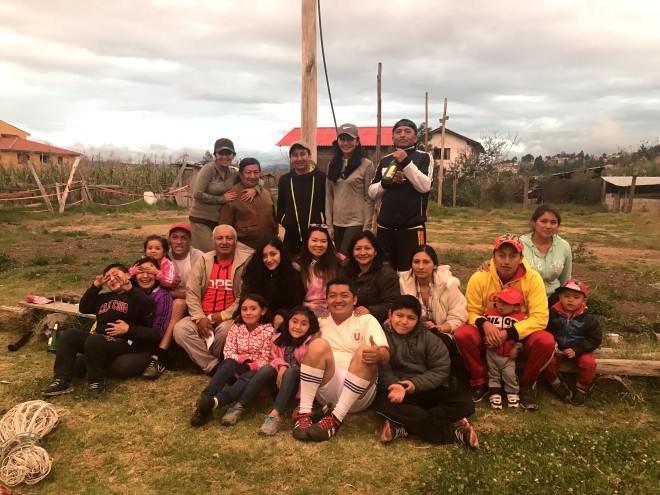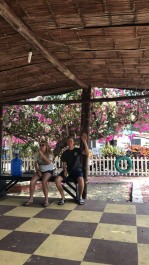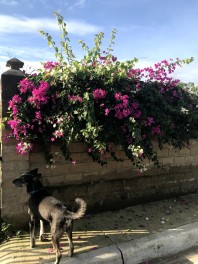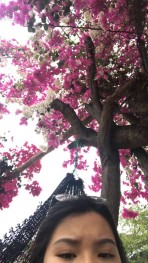Pink is the color of love. Past loves and new loves, soft love and hard loves. All of which I experienced in these 8 months.
Side note/interesting fact: My mom calls these flowers Hoa Giấy or “paper flowers.” These flowers are abundant on the coast of Ecuador, and reminded me of my home country and of my mom.

There are lot of ways to say “I love you,” literally and non-verbally. I grew up in Vietnam and the U.S., so I’ve learned how to be loved in the ways American friends and Vietnamese parents know how to love. Let me share with you the ways I was told I was loved and the times I felt cared for in Ecuador by friends, family, and coworkers.
- ¿Estas triste? – "Are you sad?"
- ¿Quiere comer? – "Do you want to eat?" The answer is yes. Every time.
- ¡Hola Maestra/ Profe. Phuong! – It was empowering to be called a teacher/professor. Also to have crowds of children swarm you and ask for your autograph.
- ¡Baja a comer! – "Come down and eat!"
- ¿Quiere ir en las bicicletas conmigo? – "Do you want to go on the bikes with me?" This particular invitation was significant to me, at that time and now still. My second oldest sister, Andrea, asked me this in my first months in Ecuador. It helped me adapt a little. Here was something I knew and could apply to a new environment to give myself a sense of familiarity and control.
- The use of usted. – My family always addressed me in the second person formally, using the verb endings for usted. This was a sign of respect, as I noticed they only used usted when talking to our host mom or dad in the family.
- ¿A donde se va? / ¿Se va? – "Where are you going? / You are going?"
- Usted es muy inteligente. – "You are very smart."
- ¿Les extrana sus padres? – "You miss your parents?"
- ¡No te vas! – "Don't go!" My extended family (aunts, uncles, cousins) gave me warm hugs and said this to me during our last Sunday Family Volleyball Game. My 8-year-old nephew said these words to me in a fit of tears the night before I left.
- ¿Quiere ir a jugar basket/volley? – "Do you want to go play basketball/volleyball?"
- Invitations – I was so thankful whenever I was asked to go places. My family's openness paired with my eagerness to participate led me to late-night basketball games with the neighborhood kids, family parties that ended at 3:00 AM, many hours dancing in heels, volleyball games played with very hard soccer balls, and trips to Cuenca on miscellaneous errands.
- ¿Quiere mas (para comer)? – "Do you want more (to eat)?" Again, a very important question.
- ¿Esta llena? – "Are you full?"
- ¿Como le fue? – "How did it go?"
- ¿Esta con gripe? / ¿Esta enferma? – "Are you sick?" Unfortunately my response to these questions was too frequently, "yes."
- "I can take you to the doctor." – My Team Leader, Diana, AKA my interim mom for these past 8 months saved my life on multiple occasions. Mentally and physically.
- House Keys – The day my family gave me the my own copy of the keys to the house, I knew I had a home.
- Making my bed – I had never made my bed in my life. I know. So when I first came to my new home, someone made my bed everyday. I would rush out of the house in a tornado of wrinkly clothes and tangled hair, backpack and papers flying everywhere, and when I came home from work or school that day, my bed would be neatly made with the door of my room open. It was a silent declaration of house rules and a sort of initiation. I started making my bed everyday and leaving the door open whenever I left the house.
- Cuidase. – "Take care of yourself."
- Tome un asiento. – "Take a seat." This phrase was a relief on those long nights I wore heels.
- Cuidado. – "Careful."
- A Buddhist in a very Catholic country – One of the first questions I was asked was if I was Catholic. I'm not. I went to church with my family a couple of times for weddings and my nephew's baptism. I was never pressured to go to church with my family, and I was never guilted nor ostracized for not going.
- Descanse. – "Rest."
- "Do you have parasites too?" – Fellows to other fellows whenever anyone had a mild stomach ache. Misery loves company! It's less frightening when your friend(s) is (are) also on the same sinking ship.
- Mija… – This is an endearing way to address a young girl, similar to daughter.
- ¿Tiene plata? – "Do you have money (to go out)?"
- Si quiere. – "If you want." This phrase was key to my sanity. It reminded me that I had the freedoms of a young adult, that I still had choices in this new environment. Feeling like I was still in control of my life and what I wanted in a foreign country and house that was not mine grounded me.
- Que bonita usted. – "How cute/beautiful you are."
- Spanish Learning – My Spanish skills can be accredited to my family, especially the youngest sister in the family, Maria. I loved that she corrected my grammar and vocabulary.
- ¿Seguro? – "Are you sure?"
- My Lamp Quest – One day I told my sisters I wanted a reading lamp at night. We walked 20,000 steps the next day to find me a lamp.
- Buen viaje. – "Good travels."
- "Let's meet in Cuenca/Azogues/Sig Sig" – These invitations were from other GCY fellows and played a huge role in keeping me from just booking a flight back home during these 8 months. Speaking English and ranting about how we miss hamburgers reminded me that I was a normal teenager and that I wasn't alone.
- Somos su familia. / es nuestra hermana. – "We are family. / You are our sister."
I am grateful to have experienced love in a foreign country. These were the times Ecuador was Pink.
*This blog was actually the latest piece in my 18 On A Gap Year Series. If you want to read more about my year (or if you just want to stay updated on my life and future endeavors) follow my personal blog: https://phuonggoes.com/blog/




